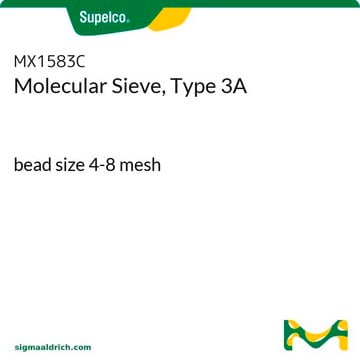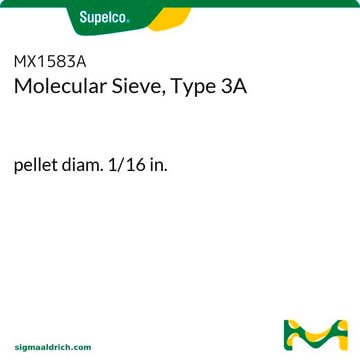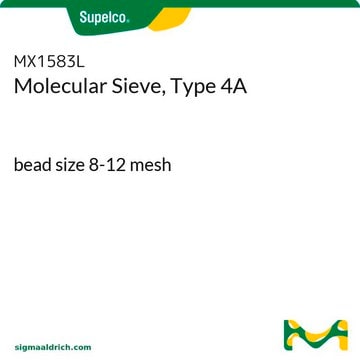MX1583D
Molecular Sieve, Type 3A
bead size 8-12 mesh
Synonym(s):
Molecular Sieve
Sign Into View Organizational & Contract Pricing
All Photos(1)
About This Item
UNSPSC Code:
23201100
Recommended Products
form
beads
bead size
8-12 mesh
color
tan
shipped in
ambient
storage temp.
room temp
General description
Molecular Sieve, Type 3A is a synthetic crystalline aluminosilicate (potassium form crystal structure or type A zeolite) with an effective pore diameter of 3 Å. It is used as an effective adsorbent. It adsorbs molecules having a kinetic diameter of less than 3 Å and excludes molecules with a kinetic diameter of greater than 3 Å.
Application
Molecular Sieve, Type 3A can be used:
- As a selective adsorbent for the adsorption of water and ammonia.
- In drying polar liquids such as methanol and ethanol.
- In commercial dehydration of unsaturated hydrocarbon streams, including cracked gas, propylene, butene, and natural gas.
Analysis Note
Color: Tan
Form: Beads
Identification (potassium): To pass test
Mesh size (8-12): 80% min
Form: Beads
Identification (potassium): To pass test
Mesh size (8-12): 80% min
Signal Word
Danger
Hazard Statements
Precautionary Statements
Hazard Classifications
Eye Dam. 1 - Skin Corr. 1B
Storage Class Code
8B - Non-combustible corrosive hazardous materials
WGK
WGK 1
Flash Point(F)
Not applicable
Flash Point(C)
Not applicable
Certificates of Analysis (COA)
Search for Certificates of Analysis (COA) by entering the products Lot/Batch Number. Lot and Batch Numbers can be found on a product’s label following the words ‘Lot’ or ‘Batch’.
Already Own This Product?
Find documentation for the products that you have recently purchased in the Document Library.
Customers Also Viewed
Optimization of manganese reduction in biotreated POME onto 3A molecular sieve and clinoptilolite zeolites
Jami Mohammed S, et al.
Water Environment Research : A Research Publication of the Water Environment Federation, 88(6), 566-576 (2016)
Effect 3A and 5A molecular sieve on alcohol-assisted methanol synthesis from CO2 and H2 over Cu/ZnO catalyst
Boonamnuay T, et al.
International Journal of Hydrogen Energy (2021)
THE REDUCING EMISSIONS OF GASES WITH GREENHOUSE EFFECT USING THE METALLIC CATALYSTS SUPPORTED. PRODUCTION TECHNOLOGY, PREPARATION, PHYSICAL AND CHEMICAL CHARACTERIZATION.
Constantinescu M and Bucura F
Progress of Cryogenics and Isotopes Separation, 13(2) (2010)
Natural gas dehydration by desiccant materials
Farag HAA, et al.
Alexandria Engineering Journal, 50(4), 431-439 (2011)
Enrichment of ammonia concentration from aqua-ammonia vapors by using 3A molecular sieve
Chiou Jenq-Shing, et al.
Energy Conversion and Management , 50(10), 2665-2669 (2009)
Our team of scientists has experience in all areas of research including Life Science, Material Science, Chemical Synthesis, Chromatography, Analytical and many others.
Contact Technical Service











